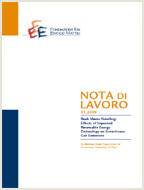The Environment and Directed Technical Change

19.06.2010
Daron Acemoglu, Philippe Aghion, Leonardo Bursztyn, David Hemous
O30, O31, O33, C65
Environment, Exhaustible Resources, Directed Technological Change, Innovation
Climate Change and Sustainable Development
Carlo Carraro
This paper introduces endogenous and directed technical change in a growth model with environmental constraints. A unique final good is produced by combining inputs from two sectors. One of these sectors uses "dirty" machines and thus creates environmental degradation. Research can be directed to improving the technology of machines in either sector. We characterize dynamic tax policies that achieve sustainable growth or maximize intertemporal welfare. We show that: (i) in the case where the inputs are sufficiently substitutable, sustainable long-run growth can be achieved with temporary taxation of dirty innovation and production; (ii) optimal policy involves both “carbon taxes” and research subsidies, so that excessive use of carbon taxes is avoided; (iii) delay in intervention is costly: the sooner and the stronger is the policy response, the shorter is the slow growth transition phase; (iv) the use of an exhaustible resource in dirty input production helps the switch to clean innovation under laissez-faire when the two inputs are substitutes. Under reasonable parameter values and with sufficient substitutability between inputs, it is optimal to redirect technical change towards clean technologies immediately and optimal environmental regulation need not reduce long-run growth.
